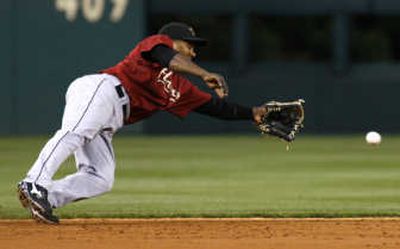Players named in Mitchell Report open year with thuds

Barry Bonds is sitting by the phone in Beverly Hills waiting for the call that even he by now must know will never come. Roger Clemens is similarly idle, hoping that his next call doesn’t come from someone at the federal courthouse.
Jose Guillen is probably wishing he had been suspended 15 days to start the season, while Jay Gibbons wishes he had a job from which to be suspended.
Milwaukee fans cringe when Eric Gagne takes the mound, and Paul Lo Duca can’t hit the ball out of the infield anymore.
To top it all off, Miguel Tejada has suddenly aged two years.
Being named in the Mitchell Report wasn’t just bad for reputations. It’s becoming a career killer.
Sure, it’s only a few weeks into the season, and only a tenth of the 162-game schedule has been played. But trends are emerging that have to make even the most gullible fan think twice about what his or her favorite player might have been doing to become so good.
The evidence is, of course, circumstantial. There might be a dozen other reasons why players named in the report are struggling, though first suspicions are often best.
It’s still early in the season, so things could change. Who knows, Lo Duca might be leading the league in home runs by July and there might even be a team desperate enough to try to sign Bonds and Clemens in a package deal.
But for now, the shame of being named in the Mitchell Report is, for a lot of players, being compounded by the embarrassment of being unable this season to do what they have done in the past.
That’s not true in the case of Tejada, who is doing fine in hitter-friendly Houston. But Tejada, who remains under investigation for allegedly lying to congressional investigators about steroids, was embarrassed enough this week when ESPN lured him to an interview and then confronted him with evidence he was actually 33, not 31.
For others, the pain is being felt on the field.
Guillen, who avoided a suspension for violating baseball’s drug abuse program only because of a deal reached between the owners and players’ union, was supposed to give the Kansas City Royals a big bat when they signed him for $36 million the same day his suspension was announced. Going into the weekend he was hitting .162 with an on-base percentage of .186 and no home runs in 68 at-bats.
At least Guillen has a job. Gibbons, who also was going to be suspended for allegedly receiving steroids and human growth hormone from a mail order pharmacy, was released by the Baltimore Orioles before the season began, though the pain of being unemployed is helped by the fact he is still collecting nearly $12 million owed to him under his contract.
Troy Glaus has a job, too. He was acquired by the St. Louis Cardinals despite reports that linked him to steroid shipments because they needed a right-handed bat to protect Albert Pujols. Glaus, who had back-to-back seasons of more than 40 home runs in his prime, has none so far this year and was yanked from a game last week because he wasn’t hitting.
Others struggling amid increased scrutiny of performance-enhancing drugs:
•Gagne, who got $10 million from the Brewers even though he allegedly received HGH shipments and baseball executives whispered that he was juiced. Gagne has blown two of his eight save appearances so far this year and his stuff doesn’t look nearly as nasty as when he saved 84 games in a row with the Los Angeles Dodgers.
•Lo Duca, who was named by supplier Kirk Radomski as a customer in at least a half-dozen HGH transactions. Lo Duca once hit 25 home runs for the Dodgers, but was hitting .200 with no home runs for the Washington Nationals before going on the disabled list Friday with a hand injury.
•Paul Byrd, the Cleveland right-hander who acknowledged reports he used HGH during last year’s playoffs, but said they were for a tumor on his pituitary gland. A newspaper reported a Florida dentist prescribed them for Byrd, who is 0-2 with a 6.00 ERA this year.
•Jack Cust, who hit 26 home runs for the Oakland Athletics last year, has one this season and is hitting .159.
•Jason Giambi, the poster boy for steroids who is being paid $23.4 million by the Yankees this year. Giambi is hitting .116, the worst average in the American League for anyone with more than 14 at-bats.
•Gary Sheffield, hitting .208 with one home run for the Detroit Tigers.